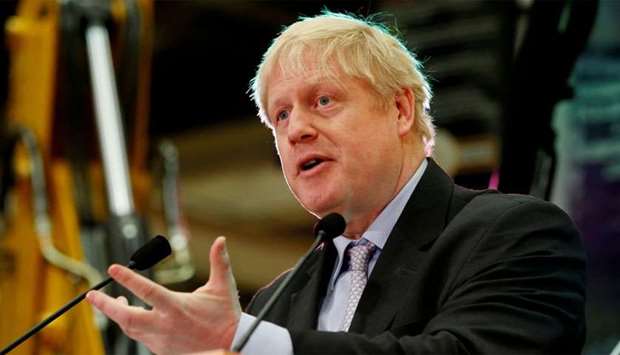Johnson is the favourite among Conservative members to take over as prime minister by the last week of July, but he will face competition from as many as 20 rivals.
The Foreign Secretary, Jeremy Hunt, was the first Cabinet minister to say he would stand, while Dominic Raab, the former Brexit secretary, said he would take time to think about it over the weekend. The Environment Secretary, Michael Gove, and the Home Secretary, Sajid Javid, are also expected to announce leadership bids in the coming days.
The contest is shaping up to be a test of where the candidates stand on Brexit, with Johnson taking a firm stance on leaving by the EU’s next deadline.
He told a conference in Interlaken, Switzerland: “We will leave the EU on October 31, deal or no deal.” He suggested he could try to renegotiate a better deal with Brussels before pressing ahead with the possibility of a no-deal Brexit if necessary. “A new leader will have the opportunity to do things differently and have the momentum of a new administration,” he said.
A supporter of Johnson said he would make an effort to secure changes to the current deal to try to ensure the Northern Ireland border backstop would not endure indefinitely, but he would press ahead with leaving on October 31 if that cannot be agreed with the EU27.
Raab, also a Leave supporter, is attracting support from some Brexit hardliners in the party, which means Johnson will come under some pressure to demonstrate how prepared he is to leave without a deal.
Avowedly soft Brexit candidates, such as Rory Stewart, the international development secretary, will be keen to position themselves as the choice for those who oppose leaving without a withdrawal agreement.
But it leaves Cabinet ministers such as Hunt, Gove, Javid, and Matt Hancock, the health secretary, with a dilemma about how far they should go in opening the door to a no-deal Brexit, having advocated May’s deal as a better option.
The candidates have begun declaring their intent even though the leadership contest does not begin officially until June 10, three days after May stands down as Tory leader. MPs will take part in several rounds of voting to whittle down the large field of about 20 to a shortlist of two by the end of that month.
One MP on the executive of the 1922 Committee, which organises the contest, said those with the fewest votes would face pressure to drop out quickly to avoid wasting time.
He predicted all but the top four to six would withdraw after the first round or two of voting. “MPs and the voluntary party all want this done as quickly as possible,” he said, dismissing any idea that May could stay on as a caretaker prime minister over the summer.
After the MPs choose their shortlist, the strongly Eurosceptic Tory party membership will vote to choose their leader, who will automatically become prime minister before parliament’s summer break. Recess dates have not yet been announced, but the Commons rose on July 24 last year.
Johnson, a former foreign secretary and leading Leave campaigner, will have James Wharton, a former MP, acting as his campaign manager. Jacob Rees-Mogg, the chair of the Eurosceptic European Research Group, is a key backer and there have been reports that the political strategist Lynton Crosby is providing informal advice.
Raab is backed by David Davis, the former Brexit secretary, and has assembled a campaign team advised by Hanbury Strategy’s Paul Stephenson, a former Vote Leave staff member.
The two men have attracted the most financial support in donations declared on the MPs’ register of interests in recent months, with Johnson amassing £130,000 and Raab £115,000.
Andrea Leadsom, a Leave supporter whose decision to quit as leader of the House of Commons helped trigger May’s departure, is another significant candidate on the Eurosceptic wing of the party. She was May’s adversary last time but dropped out of the race before the Conservative membership had a chance to vote.

